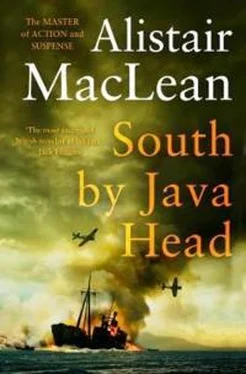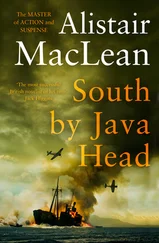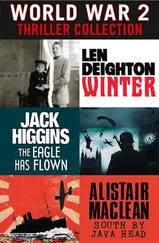“Come here, Siran.” Nicolson’s voice was as expressionless as Siran’s face. “The rest won’t give any trouble, sir.”
Siran rose to his feet, walked the few paces forward and toppled to the ground like a falling tree trunk as Nicolson struck him viciously behind the ear with the butt of his Navy Colt. The blow had carried sufficient weight to crush the skull, and it had sounded like it, but Nicolson was on his way even before Siran had fallen, Farnholme at his heels. The whole episode hadn’t taken thirty seconds from start to finish.
They ran at full speed, uncaringly, down the slope, stumbling, slipping, recovering and racing on again. Thirty yards’ from the beach they heard a sudden flurry of shots, screams of pain, oaths, high-pitched voices shouting some insane gibberish, another volley of shots then the sounds of more blows, of struggling and violent splashing as men fought hand to hand in the water. Ten yards from the water’s edge, well ahead of Farnholme by this time, and still pounding along at the full stretch of his legs, Nicolson switched on his torch. He had a confused impression of men struggling furiously in the shallow water round the boats, caught a brief glimpse of an officer poised above a fallen McKinnon with a sword or bayonet swung back for a decapitation stroke and then leapt, one arm round the officer’s throat and the gun exploding in his back, before he landed cat-like on his feet. Again his torch swung up, steadied for a moment on Walters and a Japanese sailor thrashing and splashing as they rolled over and over in the mud-stained water: nothing to be done there – as easy to kill the one as the other. The beam lifted, and stopped again.
One of the lifeboats, well aground, was lying almost parallel to the shore. Two Japanese sailors, knee-deep in the water and sharply profiled in the harsh glare of the torch, were standing close by the stern, one of them stooping with bent head, the other upright, arm upraised, his right hand far behind his head. For a long second of time, all volition inhibited by the light that blinded their shrinking eyes, the two men held their respective positions, a frozen sequence from some nightmare ballet: and then, in perfect unison, petrified stillness yielded to convulsive action, the stooped man straightening with his right hand clutching something snatched from the net bag tied to his belt, the other dropping his left shoulder and lunging forward as his throwing arm came flashing over, and Nicolson, even as he brought his Colt up, his finger tightening on the trigger, knew that he was already too late.
Too late for Nicolson, too late for the Japanese sailors. For a second time they stiffened into immobility, brought up short by the savage jerk of some invisible hand, then they began to move again, slowly, this time, very slowly, pivoting forward with an almost ponderous deliberation on rooted, lifeless legs: Nicolson’s torch had switched off and the crash of Farnholme’s carbine was only an echoing memory as they fell on their faces, one full length into the water, the other jack-knifing heavily over the gunwale of the lifeboat and crashing on to the sternsheets, the sound of his falling lost in a flat explosive crack and sheet of blinding white as the grenade exploded in his hand. After the bright light of the bursting grenade the darkness was doubly dark.
Darkness everywhere, on land, over the sea and in the sky, complete and, for the moment, impenetrable. Away to the south-west a last few stars winked faintly in an indigo sky, but they too were going, extinguished one by one as the unseen blanket of cloud closed with the horizon. Dark, and very silent; there was no sound, no movement at all.
Nicolson risked one quick sweep with his lighted torch, then clicked off the switch. His men were all there, all on their feet, and the enemy were the enemy no longer, just little dead men lying still in the shadows. They had had next to no chance at all: they had expected no attack, deeming the Viroma ’s crew safely pinned in the hollow by the submarine’s covering fire: they had been silhouetted against the sea, always lighter by night than the land: and they had been caught at a crippling disadvantage in the moment of stepping from their rubber boats into the sea.
“Anybody hurt?” Nicolson kept his voice low.
“Walters is, sir.” Vannier matched his tone with Nicolson’s. “Pretty badly, I think.”
“Let me see.” Nicolson moved across to the source of the voice, hooded the torch with his fingers and clicked the switch. Vannier was cradling Walters’s left wrist in his hand: it was a gaping, gory wound just below the ball of the thumb, and half the wrist was severed. Vannier already had a handkerchief twisted as a tourniquet, and the bright red blood was pulsing only very slowly from the wound. Nicolson switched off the light.
“Knife?”
“Bayonet.” Walters’s voice was a good deal steadier than Vannier’s had been. He prodded something lying still and shapeless at his feet in the water. “I took it from him.”
“So I gathered,” Nicolson said dryly. “Your wrist’s a mess. Get Miss Drachmann to fix it for you. It’ll be some time before you can use that hand, I’m afraid.”
Which was one way of saying ‘never,’ Nicolson thought bitterly to himself. The clenching tendons had been severed clean through, and it was a certainty that the radial nerve had gone also. Paralysis, in any event.
“Better than the heart,” Walters said cheerfully. “I really need that.”
“Get up there as fast as you can. The rest of you go with him – and don’t forget to announce yourselves. For all the captain knows we lost – and he’s got a gun lying handy. Bo’sun, you stay with me.” He broke off suddenly as he heard splashing in the vicinity of the nearest lifeboat. “Who’s there?”
“Me, Farnholme. Just investigatin’, old boy. Dozens of them, actually dozens of them.”
“What the devil are you talking about?” Nicolson asked irritably.
“Grenades. Bags full of ’em. Fellow here like a walkin’ arsenal.”
“Take them away, will you? We may need them. Get someone to help you.”
Nicolson and McKinnon waited till the last of the men had gone, then waded out towards the nearest lifeboat. Just as they reached it, two machine-guns opened up from the darkness to the south, tracer bullets burning white then extinguishing in vicious plops and gouts of water. Now and then a freak ricocheted off the water and whined thinly into the darkness: more rarely still a bullet thudded solidly into one or other of the lifeboats.
Stretched full length behind a boat, only his head above water, McKinnon touched Nicolson on the arm. “What’s all this in aid of, sir?” The soft Highland voice was puzzled, but completely unworried.
Nicolson grinned to himself in the darkness. “Anybody’s guess, Bo’sun. Chances are that their landing party was supposed to signal – torch or something – if they landed safely. Alarums and excursions ashore and our pals on the sub climbing the walls with uncertainty. Finally, they open up – no signal.”
“And if that’s all they’re wanting, why shouldn’t we be sending them one?”
Nicolson stared at him for a moment in the darkness, then laughed softly.
“Genius, McKinnon, pure genius. If they’re all confused, and if they imagine their pals ashore are as confused as they are themselves, any old signal has a chance of getting by.”
And so it proved. Nicolson raised his hand above the lifeboat gunwale, flashed the torch irregularly on and off, then hurriedly withdraw his arm. To any trigger-happy machine-gunner that pinpoint of light must have been the answer to a prayer, but no line of tracers came lancing at them out of the darkness. Instead, both machine-guns abruptly ceased fire and all at once the night was silent and still. Land and sea alike might have been deserted; empty of all life: even the blurred silhouette of the submarine lying quietly out to sea was only a shadow, insubstantial and quite unreal, more imagined than seen. Furtive attempts at concealment seemed not only unnecessary but dangerous.
Читать дальше
Конец ознакомительного отрывка
Купить книгу










